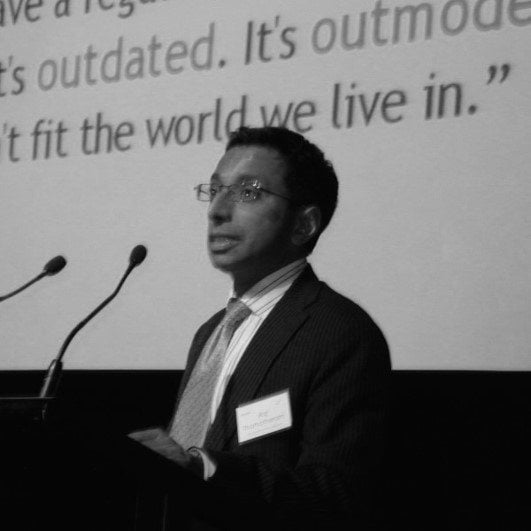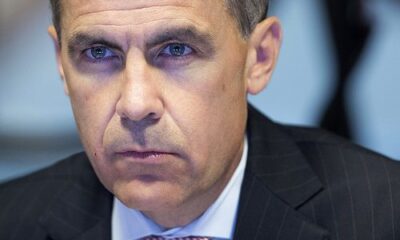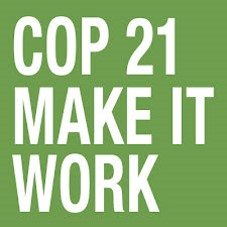

Interview
Exclusive interview: Raj Thamotheram, CEO of Preventable Surprises, talks about Forceful Stewardship
Dr Raj Thamotheram is the CEO and co-founder of Preventable Surprises. He is a well recognised thought-leader on how companies and investors can adapt to put people and planet on par with profit and so deliver long-term value to their clients/customers and society. He has held senior positions in the pension fund and investment management industries and the NGO world. In 2013 he asked, “We’ve had 20 years of sustainable investment and is the world getting any better?” Today he talks to Blue & Green about Forceful Stewardship.
In 140 characters or less – what is Forceful Stewardship?
Tackling #climatechange needs more than divest:invest and portfolio decarbonization: #forcefulstewardship guidelines are essential third leg.
What was the key driver for writing this report?
The key driver for the report was an increasing awareness that the risk management paradigm dominant in the investment industry today – diversification, hedging and ‘constructive engagement’ with companies – is not fit for purpose when it comes to climate related systemic risk.
The only viable solution for managing systemic climate risk is to make a rapid transition to a low carbon economy, which means shrinking high-carbon energy as well as growing low-carbon energy. This means adopting significantly different risk management strategies than investors have been using for dealing with company, sector or even asset class risks.
This was the consensus from a week long virtual dialogue that Preventable Surprises ran with 77 senior finance, investment, risk and other professionals with climate experts. 85% of the participants agreed with the proposition that “fiduciary capitalism requires a fundamentally different risk management strategy to address portfolio-wide systemic risks”
With dominant risk management instruments not sufficiently effective, it is clear that another element is needed. That element is Forceful Stewardship – the essential third leg of investor action on climate change.
Who is it primarily for?
Forceful Stewardship is a strategy for igniting investor action. It encourages investors in companies to push for 2C transition plans, using their shareholder voting rights. To achieve this, Preventable Surprises aims to leverage its vast network of connections within the finance industry, to influence institutional investors and the various parties within the financial ecosystem affecting and influencing their decisions.
To bolster support for Forceful Stewardship guidelines, we are also engaging with well-informed scientists, economists and civil society experts. Engagement with legislators and regulators will also be nurtured wherever possible.
The report itself is for:
1) Those investors who are already committed to doing something on climate risk to make sure they have this 3rd leg covered well and specifically to make sure decision-makers in these organisations have understood their role since adopting the FS guidelines cant be done at the level of the ESG head
2) Those investors who’ve decided not to do divestment and not to do decarbonization and hence think they cant do anything. On the contrary!
What difference do you want it to make?
Christiana Figueres says we have between 5-10 years if we are lucky to get back on the path for 2C. That means real reductions in GHG emissions. Investors have so far been focusing mainly on indirect routes to this goal – divestment and portfolio decarbonization. All that and more is needed but we also need the 3rd leg, robust engagement backstopped by resolutions which force the very large fund managers to say what they think in public.
What are the barriers to making that difference?
We are anticipating the following challenges:
Climate change does not feature among the top ten concerns of investment managers
Our response: We continue to develop and promulgate analysis of significant portfolio VAR from climate damage. We use analogies from the global financial crisis, as well as sector specific incidents of loss of value e.g. coal, tobacco. We work with organisations such as Client Earth to highlight the risk of litigation if fiduciary responsibilities are neglected. And we stress a major advantage of the forceful stewardship approach – namely that investment managers can continue managing money as they want – all they have to do is to agree to vote in the right way.
Many of the largest investors routinely vote with management
Our response: Working directly and through ‘good cop’ partner organisations (eg major asset owners who are clients), we will try to persuade senior investment executives of the need to put their clients first and better manage whatever conflicts of interests or cultural obstacles are getting in the way of doing the right thing. If needed, we will also work with ‘bad cop’ partner organisations who can highlight in public inconsistent investor behaviour (e.g. voting for disclosure in the 2015 Aiming for A resolutions but against similar resolutions elsewhere).
Weaker forms of engagement eg private meetings may be regarded as sufficient
Our response: We will challenge proponents of this view to evidence how they are bringing about required change in company behaviour with sufficient urgency, working with partner organisations (both ‘good cop’ and ‘bad cop’ players) to make the Guidelines a new benchmark standard.
Who’s helping you overcome those barriers?
Preventable Surprises is working with ‘positive mavericks’ in many organisations to help achieve the change that everyone knows is needed and also is possible. Organisational immunity to change – and not just in the fossil fuel sector – is our common challenge and that is why these positive mavericks are critical.
Is investment action today commensurate with the significant economic, social and environmental challenges we face?
Investment behaviour is not well aligned with the significant economic, social and environmental challenges society faces. The disconnect is really stark with respect to a serious systemic risk like climate change but the challenge goes wider, as has been recognised by the new President of the CFA Institute, John Kay and many others.
Are you confident COP21 will agree and then deliver a robust protocol that addresses the significant economic, social and environmental challenges we face?
Lets focus on climate change because this is what COP21 is about. And the news here is both good and bad. The good news is that we really have serious momentum for significant change. The bad news is that high carbon companies and fossil fuel countries have fought hard to ensure COP21 doesn’t result in
disruptive change any time soon. They certainly haven’t had everything their way – and great credit goes to Christian Figueres and others like her – but on the key question of binding targets to keep warming below 2C and a carbon price which is fit for purpose, we’re not there yet – Paris is expected to get us to 3.5C, may be 3C. Investors are arguably one of the best ways to ratchet up this agreement and put us on track for 2C in the time we have. And the most effective thing investors can do is take a simple policy decision to adopt the Guidelines. This cost efficient tool will put them on the right side of history.
How can people – individuals and organisations – find out more about Preventable Surprises?
We have a lot of information about our climate work on our website www.preventablesurprises.com You can also follow us on Twitter @preventableS If you have a question you don’t think we’ve answered, we are keen to hear from you! Please send me questions but also be patient – with a volunteer staff base, we may not reply instantly. And if you’d like to help in any way, also do contact me at olivia.stewart[at]preventablesurprises.com.


 Environment12 months ago
Environment12 months agoAre Polymer Banknotes: an Eco-Friendly Trend or a Groundswell?

 Features11 months ago
Features11 months agoEco-Friendly Cryptocurrencies: Sustainable Investment Choices

 Features12 months ago
Features12 months agoEco-Friendly Crypto Traders Must Find the Right Exchange

 Energy11 months ago
Energy11 months agoThe Growing Role of Solar Panels in Ireland’s Energy Future



























